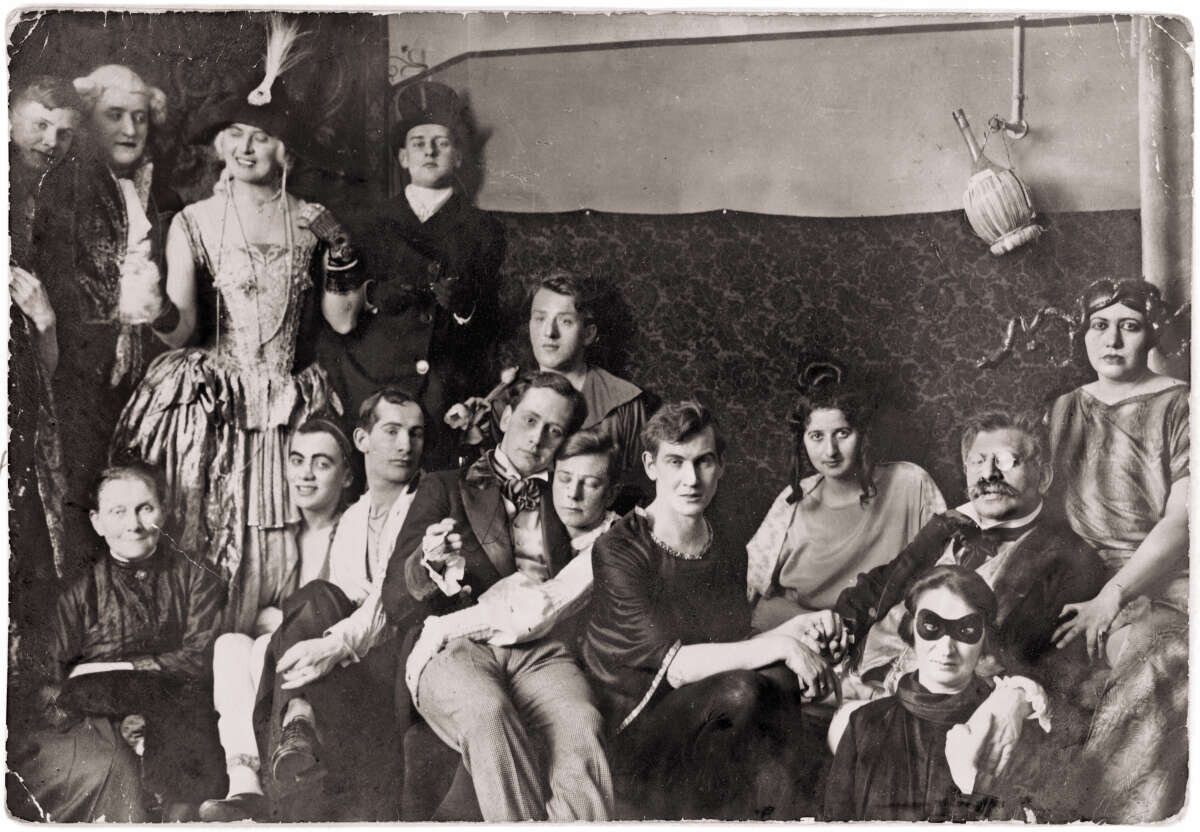
Agrandissement : Illustration 1

In 1897, the German and Jewish sexologist Magnus Hirschfeld* (1868-1935) initially created the Scientific-Humanitarian Committee to repeal Paragraph 175* (an anti-homos and de facto anti-LGBTQIA+ piece of legislation).
Hiding his own homosexuality from his colleagues for fear of being discredited, he studies the issues of gender, sex and orientation. He studies LGBT* issues. His actions and research on the community, especially on transidentities remain foundational. He wrote for the first time about this last subject in 1910.
Pioneer of modern sexology and father of the first homosexual movement (1897-1933), he created the Institute for Sexology (kind of the first LGBTQIA+ center in history) and institutionalized gender affirming care for example during the 1920s-1930s.
A ray of hope under the Weimar Republic
After the Great War, Weimar Republic (1918-1933) was a real hope for the Community. Between 80 and 120 places hosting mainly LGBTQ+ customers (nightclubs like L'Eldorado*, cafes, bars...) existed in Berlin alone.
Several magazines and newspapers were talking about LGBTQIA+. A 1919 film, 'Different from the others', directed by Richard Oswald and written by Magnus Hirschfeld, talks for the first time with homosexuality without taboo. And major left-wing parties stand forSection 175 abolition.
For the first time, lesbians, homos, bi, trans people and other Community members can be free and independent. It is a real cultural, social, scientific and political revolution that takes place.
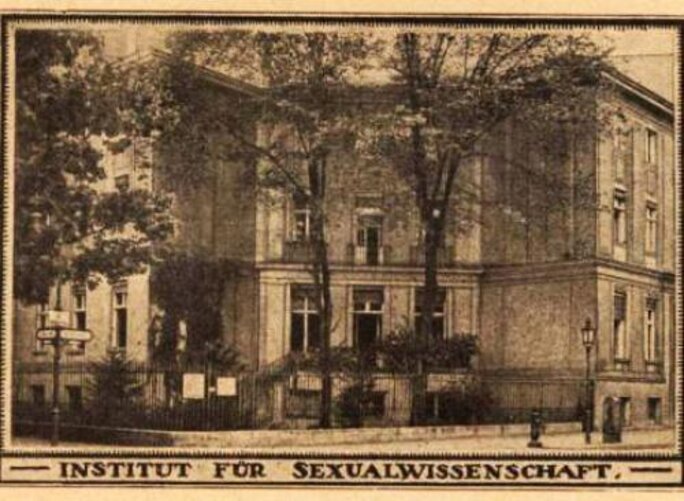
The first LGBTQIA+ center in history: the Institute of Sexology
True pioneer, Hirschfeld is known as the 'Einstein of Sex'. In 1919 he founded the Institute for Sexology in Berlin, with the aim of institutionalizing this scientific discipline. Hirschfeld presents it as a 'place of research, teaching, care and refuge' to 'free the individual from his physical ills, psychological afflictions and social deprivation'. It is therefore a real source of knowledge.
The place had as he said other functions: accommodate for example people LGBT, propose shows, ensure a medical follow-up etc. And it also offered advice concerning abortion, pregnancy and STDs.
It is the world’s first LGBT+ center. The institute had 115 rooms. Some were open to the public, for example for conferences. One of them probably talked about women, society and body control. There was a museum inside. Other rooms were used as laboratories or examination and operating rooms.
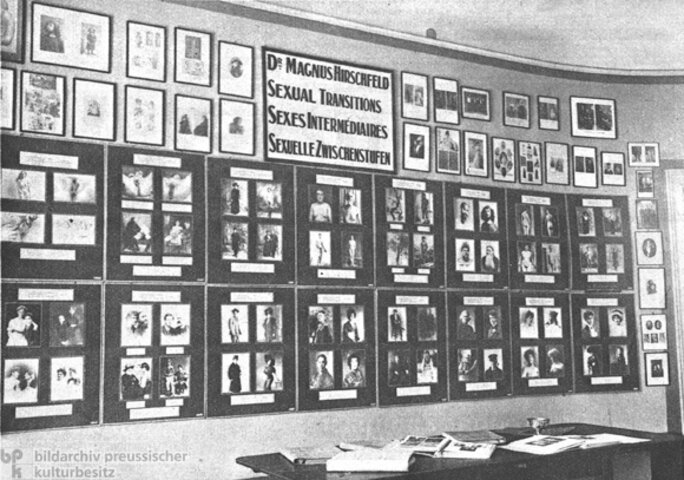
The first medical transitions in history
Member of the SPD, Hirschfeld was one of the fathers of the first homosexual movement. In 1921 he founded the World League for Sexual Reform. He stands for the recognition of trans people, studying scientifically the issue of transidentities. He employed trans people in his Institute. He wanted accompanying them on their journey by providing medical advice.
During The Weimar Republic happened the first successful and complete transition operations. Dora Richter (1891-1966), a trans woman, was the first person who transitionned by this way, between 1922 and 1931, thanks to the Institute of Sexology in Berlin. She worked there. The Institute was the only place in the world to offer these operations, which were very risky at the time (several trans women died before 1931). The persons concerned were followed up by experts from the SHC. The Institute offered hormonal treatments, but also surgeries called 'sexual reassignment or gender affirming'.
Hirschfeld knew the importance of gender-affirming care (not just operations) for trans people's mental health. He proved the risk of suicide without care. He creates a 'transvestite' passport allowing, for example, a trans couple followed by the Institute (the American-German intellectual Charlotte Charlaque and the German painter Toni Ebel) not to be worried by the police. A progress at this time. These two women lived at the Institute. Toni Ebel was able to change her name in 1930. Charlotte Charlaque said her surgery was the most amazing thing that ever happened to her.
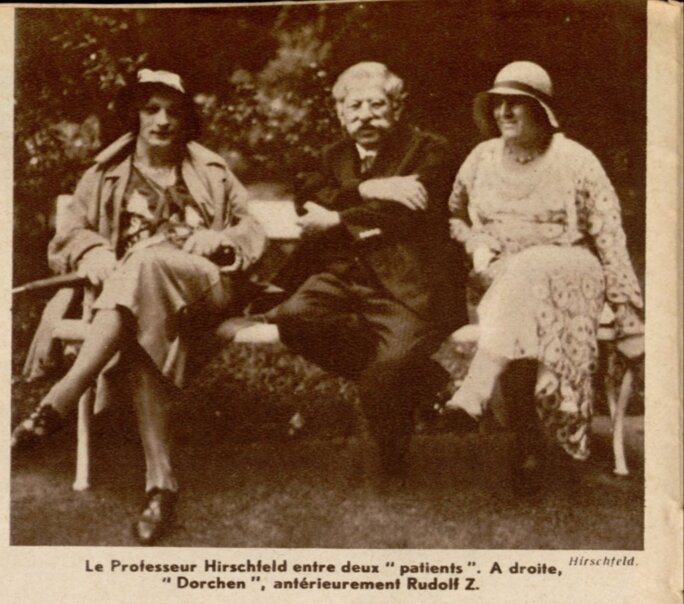
Agrandissement : Illustration 4

However, some of Hirschfeld’s writings have been questioned by others scientists since. The destruction of his Institute, laboratories, several of his research, museum and the end of consultations and operations, as well as his death in Nice in 1935 prevented him from improving his research. Historian Florence Tamagne says, 'If we want to simplify..., Hirschfeld defines homosexuality as having 'a woman’s soul trapped in a man’s body'' This theory has been revised.
In addition to a specific view of homosexuality, he developed sexist, racist and
eugenic views. But historians show that Hirschfeld laid the foundation for LGBTQIA+ sexology, especially for gay and trans people. This work almost disappeared few months after Nazis came to power.
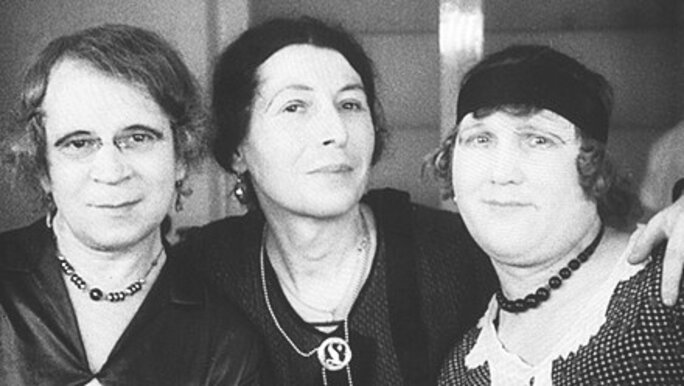
Sociological, historical and sexological vocabulary around LGBTQIA+ issues
LGBTQIA+: Lesbian, Gay, Bi, Trans, Queer, Inter, Agender, Asexual, Aromantic people
Sexology: a scientific discipline studying gender, orientation and identity behaviours. It was institutionalized in 1919.
Paragraph 175 (1871-1994) : created under the Second Reich, this section was intended to penalize homosexuals. But penalized trans people also for example. Changed in 1935, it has been modified in 1969. It disappeared in 1994.
The First Gay Movement (1897-1933) took place in Germany. It was a period of fight in LGBTQIA+ history.
'Sexual reassignment surgery' : depending on the person, it could consist of 2 or 3 operations for example. Very risky, they were the first of their kind and experimental.
Eldorado (1919-1932) : popular nightclubs and cabaret for LGBT+ clients mostly, located in Berlin, the Eldorado has become a symbol.
References
Eldorado : everything the nazis hate, documentary by Benjamin Cantu (real), Film Base Berlin (2023).
'Transgender People, the Nazi State, and the Holocaust', interview video with Laurie Marhoefer, Museum of Jewish Heritage, New York (5 June 2023).
Arnaud Alessandrin, 'Transidentities : the History of a category', Encyclopédie d’histoire numérique de l'Europe [online], ISSN 2677-6588, published on 22/06/20 , consulted on 03/05/2024. Permalink: https://ehne.fr/en/node/12504
'LGBTQIA+ The history of the Institute for Sexology destroyed by the Nazis', article by Pauline Petit, Radio France (12/06/2023).



